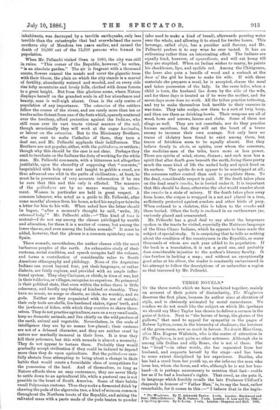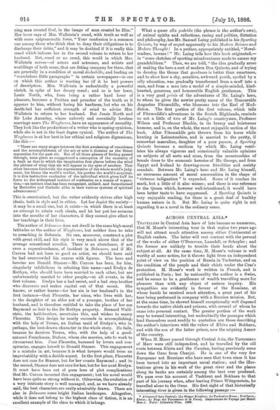THREE NO VE LS.*
OF the three novels which we have bracketed together, mainly on account of their points of dissimilarity, The Wayfarers deserves the first place, because its author aims at elevation of style, and is obviously animated by moral earnestness. We confess we do not much like the subject on which Mr. (perhaps we should say Miss) Taylor has chosen to deliver a sermon in the guise of fiction. Next to "the heroes of hemp, the glories of the gallows," that used to appeal for sympathy in the pages of Bulwer Lytton, come, in the hierarchy of shadiness, the heroines of the green-room, now so much in favour. No doubt Miss Grey, alias Mrs. Eugene Walleteio, who is the centre of attraction in The Wayfarers, is not quite as other actresses. Although she is among idle Dollies and silly Roses, she is not of them. She has "lived "—in other words, she has separated from her husband, and supports herself by the stage—and has been to some extent disciplined by her experience. Besides, she has bad a creed from her youth up, as she informs the man who loves her, whom she loves, and who, although he is not her hus- band—it is perhaps unnecessary to mention that fact—scolds her as if he had a husband's rights. That creed, as she puts it, in language which forcibly recalls the late Professor Clifford's rhapsody in honour of" Father Man;' is, to say the least, rather remarkable, for it comes to this :—" I believe that in the begin.
• The Wayfarers. By U. Ashworth Taylor. 2 vols. London : Blackwood and Bone. 1886.—Delatnere. By E. Curzon. 3 vols. London : 8. Low and Co. 1888.- .1 Sporting Quixote. By B. Liana,. 2 vols. London : Chapman and HAIL 1886.
fling man created God, in the image of man created he Him." Her lover says of Mrs. Wallstein's creed, with truth as well as with some epigrammatic force, "Your confession is a common one among those who think that to deny their obligations is to discharge their debts," and it may be doubted if it is really this creed which induces her in the second volume to return to her husband. But, creed or no creed, this world in which Mrs. Wallstein moves—of actors and actresses, and artists and worldlings of both sexes, that are fitting company for them, that are generally in a condition of moral deshabille, and feeding on "scandalous little paragraphs" in certain newspapers—is one on which this author is wasting her (if it be her) powers of description. Mrs. Wallstein is undoubtedly a powerful sketch, in spite of her dreary creed ; and so is her lover, Louis North, who, from being a rather hard lover of pleasure, becomes a Puritan and preacher of the truth as it appears to him, without losing his hardness, but who on his death-bed has sufficient strength of mind to advise Mrs. Wallstein to return to her husband. But Jossie North and Sir Luke Annerley, whose unlovely and essentially loveless marriage mars The Wayfarers, have an appearance of unreality. They look like the productions of a writer who is apeing cynicism, while she is not in the least degree cynical. The author of The Wayfarers is at her best in her ethical and religions digressions, like this :—
"There are many stages between the first awakening of conscience and the accomplishment of the act or acts it dictates as the fittest reparation for the past sin. Bat of all those phases of feeling passed through, none gives so exaggerated a conception of the enormity of a fault as that in which the imagination first places before the mind the picture of what that sin will appear in the eyes of another. That other becomes forthwith the representative of the whole world's judg- ment, his blame the world's verdict, his pardon the world's acquittal. It is this instinctive exaltation of the individual which gives half its force to the widespread instinct of confession as a means of repara- tion,—an instinct that has been recognised, utilised, and formularised by Methodist and Catholic alike in their various systems of spiritual advancement."
This is overstrained, but the writer evidently strives after high ideals, both in style and in ethics. Let her depict the society— it may be a small one, but it exists—in which there is at least an attempt to attain such ideals, and let her put her sermons into the mouths of her characters, if they cannot give effect to her teachings in their lives.
The author of Delanzere does not dwell in the same high moral latitudes as the author of Wayfarers, but neither does he take to preaching in Bohemia. He can, moreover, construct a plot with great skill, and his style is very much above that of the average sensational novelist. There is an abundance, if not even a superabundance, of incident in Delamere, and if Mr. Curzon had not been so good an artist, we should have said he had overcrowded his canvas with figures. The hero and heroine are Donald Stamer—Mr. Curzon has been, for him, singularly infelicitous in selecting this name—and Evelyn de Ruthyn, who should have been married to each other, but are unfortunately married to other people,—at all events, in the first volume. Evelyn has a bad secret, and a bad step-brother who discovers and makes capital out of that secret. She knows, or rather learns—for her sin is her husband's in the first instance—that Flenrette, her niece, who lives with her, is the daughter of an elder not of a younger, brother of her husband, and is therefore entitled to take the place of her son Raymond as heir to the De Ruthyn property. Bernard Wald- stein, the half-brother, ascertains this, and wishes to marry Fleurette. This design he nearly succeeds in accomplishing, with the help of Teresa, an Italian maid of Evelyn's, who is, perhaps, the best-drawn character in the whole story. He fails, because he deceives Teresa, who, with the help of a good- natured Frenchman, Dufour, whom she marries, sets to work to circumvent him. Poor Fleurette, harassed by lovers and con- spiracies, engages herself to Donald Stamer. This engagement is a mistake in art, because it is what lawyers would term an improbability with a double aspect. In the first place, Fleurette does not care for Starner, but for her cousin Raymond ; and in the second, Stamer does not care for her, but for her aunt Evelyn. It must have been out of pure love of plot complications that Mr. Curzon invented this engagement; but his novel would have been quite as strong without it. Otherwise, the evolution of a very intricate story is well managed, and, as we have already said, the best characters are really admirably drawn. There are also in Delamere some bright Italian landscapes. Altogether, while it does not belong to the highest class of fiction, it is an excellent example of the class to which it belongs.
What a queer olla podrida (the phrase is the author's own), of animal spirits and reflections, racing and politics, flirtation and philosophy, has Mr. Samuel Laing published in his Sporting Quixote, by way of sequel apparently to his Modern Science and Modern Thought ! In a preface, appropriately entitled, "Novel- readers, beware ! " Mr. Laing tells how this book originated,— in "some sketches of sporting misadventures made to amuse my grandchildren." Then, we are told, "the idea gradually arose of making the hero a sort of modern Don Quixote, and of trying to develop the theme that goodness is better than smartness, and to show how a shy, sensitive, awkward youth, spoiled by a silly education, was gradually transformed from a muff into a man, and from a man into a model of a simple-minded, kind- hearted, generous, and honourable English gentleman. This is a very good prgcis of the adventures of Mr. Laing's hero, to whom he gives the nowise pretty name of the Honourable Augustus, Fitzmnddle, who blossoms into the Earl of Mud- dleton. The first portion of the first volume, which tells of Fitzmuddle's adventures in the Scotch Highlands, reminds us not a little of two of Mr. Laing's countrymen, Professor Wilson and Professor Blackie, in its breezy and boisterous humour, and is, on the whole, the most enjoyable section of the book. After Fitzmuddle gets thrown from his horse while hunting in Leicestershire, and is married to the pretty, if somewhat masculine, daughter of a poor parson, A Sporting Qui.xote becomes a medium by which Mr. Laing venti- lates his always vigorous and occasionally valuable opinions on subjects of all sorts and sizes, from the monstrosities of female dress to the economic heresies of Mr. George, and from Egypt and Ireland to drawing-room frivolities and society scandals. Between Mr. Laing's hero and Mr. Laing himself, an enormous amount of moral ammunition in the shape of "virtuous indignation" is expended. Some of it reaches its mark, but a little of it also misses ; and there is one reference to the Queen which, however well-intentioned, it would have been better taste to have suppressed. A Sporting Quixote is very enjoyable reading, for there is a great deal of healthy human nature in it. But Mr. Laing is quite right in not regarding it as a novel in the ordinary sense.

















































 Previous page
Previous page